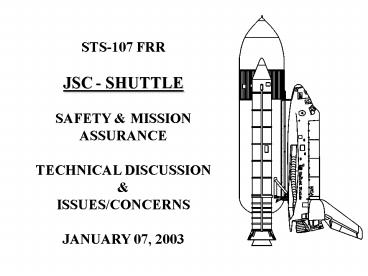Par Chart Template PowerPoint PPT Presentation
1 / 13
Title: Par Chart Template
1
STS-107 FRR JSC - SHUTTLE SAFETY MISSION
ASSURANCE TECHNICAL DISCUSSION ISSUES/CONCERNS
JANUARY 07, 2003
2
JSC SIGNIFICANT EVALUATION ACTIVITIES STS-107
(OV-102) FRR TAGUP
DISCUSSION ITEMS OV-103 BSTRA CRACK BY HUGO
MARTINEZ ONE PAGE SUMMARIES
AS OF 01/06/03 DAVE BROWNE SEA-J-0101
3
OV-103 BSTRA CRACK STS-107 FRR TAGUP
AS OF 01/06/03 HUGO MARTINEZ SPECIAL
TOPIC-J-0100
4
OV-103 BSTRA CRACK STS-107 (OV-102) FRR TAGUP
- SUMMARY
- At the STS-107 PAR SRQAs recommendation was
that the OV-103 Ball Strut Tie Rod Assembly
(BSTRA) ball crack is a constraint to STS-107
(OV-102). - Testing is underway in an attempt to clear
cracked BSTRA balls for flight with margin. - Demonstrate that cracks are caused by thermal
cycling under load. - Demonstrate that cracks arrest after a given
number of cycles. - Analysis will attempt to prove that any FOD
liberated from the BSTRA balls will not cause
particle ignition or otherwise adversely impact
Orbiter MPS or SSME operation. - A risk assessment is underway to determine the
probability of crack initiation as well as the
probability of generating a piece of debris large
enough to cause a catastrophic failure. - Design and fabrication of inspection tools to
remotely rotate and inspect the BSTRA balls on
the vehicles is in work. - Constraint to STS-107.
MEETING DATE 01/07/03 HUGO MARTINEZ SPECIAL
TOPIC-J-0101
5
OV-103 BSTRA CRACK STS-107 (OV-102) FRR TAGUP
- ISSUE
- During Orbiter Maintenance Down Period (OMDP)
inspections of the OV-103 17-inch feedline BSTRAs
a crack was observed on a Liquid Oxygen (LO2)
BSTRA ball. - IMPACTS/EFFECTS
- Worst case effect of a malfunctioning BSTRA joint
is feedline rupture/leakage due to increased
stresses on the feedline bellows and other
components resulting from lack of feedline
angulation (Criticality 1/1 CIL Catastrophic /
Remote / Accepted Risk Hazard). - Worst case effect of a piece of debris liberated
from a cracked BSTRA ball is catastrophic SSME
failure (Criticality 1/1 CIL Catastrophic /
Remote / Accepted Risk Hazard).
MEETING DATE 01/07/03 HUGO MARTINEZ SPECIAL
TOPIC-J-0102
6
OV-103 BSTRA CRACK STS-107 (OV-102) FRR TAGUP
- BACKGROUND
- BSTRA balls were only inspected for surface
defects during manufacturing. - All BSTRA balls in flight spares will be
inspected for subsurface defects. - Subsurface defects found on 3 of 15 balls
inspected at KSC. - A test program was initiated at Huntington Beach
(HB) to - Demonstrate crack initiation due to thermal
stresses. - Demonstrate crack arrest (Tests 2a 2b).
- In parallel to HB testing, MSFC investigated
means of cracking balls for use in Tests 2a 2b.
MEETING DATE 01/07/03 HUGO MARTINEZ SPECIAL
TOPIC-J-0103
7
OV-103 BSTRA CRACK STS-107 (OV-102) FRR TAGUP
- BACKGROUND (contd)
- Testing to date has shown
- A ball with subsurface defects can be cracked in
a flight-like thermal gradient. - A 1.75 ball cracked during ambient-to-LN2
testing. - FOD can be generated in an off-nominal thermal
gradient. - Testing is continuing to
- Determine if cracks arrest in a flight-like
(combined thermal and mechanical) environment. - Cracks on two test balls have not grown
throughout 18 flights worth of testing (30
flights planned). - Determine if FOD can be generated in a
flight-like environment. - Testing to date has not resulted in FOD
generation. - Analysis will attempt to prove that any FOD
liberated will not cause particle ignition or
otherwise adversely impact Orbiter MPS or SSME
operation.
MEETING DATE 01/07/03 HUGO MARTINEZ SPECIAL
TOPIC-J-0104
8
OV-103 BSTRA CRACK STS-107 (OV-102) FRR TAGUP
- BACKGROUND (contd)
- 100 borescope inspection of any BSTRA ball is
now possible. - Prototype tools to remotely rotate the ball and
view its entire surface are being developed. - Subsurface inspections via eddy current may also
be possible. - Orbiter must be demated from ET without SSMEs
installed. - Analysis is in work to
- Determine the probability of crack initiation in
flight-like environment. - Determine the probability of generating a piece
of debris large enough to cause particle ignition
or other catastrophic SSME failure.
MEETING DATE 01/07/03 HUGO MARTINEZ SPECIAL
TOPIC-J-0105
9
OV-103 BSTRA CRACK STS-107 (OV-102) FRR TAGUP
- ROOT CAUSE
- Root cause is under investigation. Most probable
cause is attributed to the brittle properties of
the BSTRA ball material combined with thermal
cycling, possibly initiated by an undetected flaw
in the ball. - RECOMMENDATION
- Constraint to STS-107 pending successful
completion of - HB testing on the 1.75 ball that cracked during
ambient-to-LN2 testing. - Crack arrests prior to the ball cracking in half.
- Cracking does not result in unacceptable step at
crack location. - No FOD generation beyond acceptable level (FOD
criteria TBD). - 100 surface inspection of cracked OV-103 ball.
- No evidence of particle liberation.
- No surprises (i.e. crack is consistent with most
probable cause).
MEETING DATE 01/07/03 HUGO MARTINEZ SPECIAL
TOPIC-J-0106
10
BACKUP
MEETING DATE 01/07/03 HUGO MARTINEZ SPECIAL
TOPIC-J-0107
11
OV-103 BSTRA CRACK STS-107 (OV-102) FRR TAGUP
MEETING DATE 01/07/03 HUGO MARTINEZ SPECIAL
TOPIC-J-0108
12
OV-103 BSTRA CRACK STS-107 (OV-102) FRR TAGUP
MEETING DATE 01/07/03 HUGO MARTINEZ SPECIAL
TOPIC-J-0109
13
OV-103 BSTRA CRACK STS-107 (OV-102) FRR TAGUP
MEETING DATE 01/07/03 HUGO MARTINEZ SPECIAL
TOPIC-J-0110

